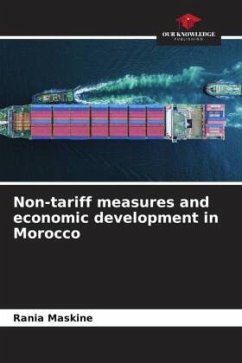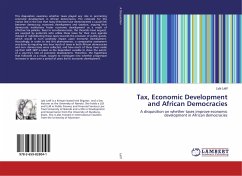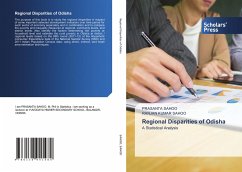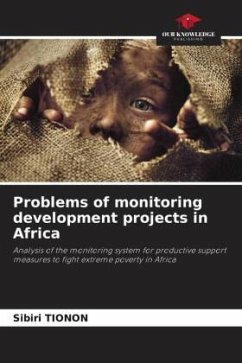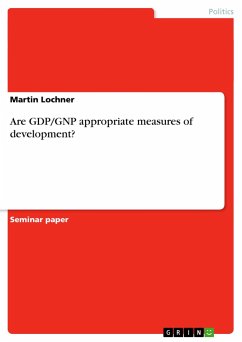
Are GDP/GNP appropriate measures of development?

PAYBACK Punkte
0 °P sammeln!
Seminar paper from the year 2005 in the subject Politics - International Politics - Topic: Development Politics, grade: 2.0, Friedrich-Alexander University Erlangen-Nuremberg (Institut für Politische Wissenschaft), course: Introduction to Development Studies, language: English, abstract: One of the most important questions of development politics is what development actually means and how you can measure it. Although nobody will seriously dispute the fact that development has an important political dimension it is usually the economy which is in the focus of multinational organizations as for...
Seminar paper from the year 2005 in the subject Politics - International Politics - Topic: Development Politics, grade: 2.0, Friedrich-Alexander University Erlangen-Nuremberg (Institut für Politische Wissenschaft), course: Introduction to Development Studies, language: English, abstract: One of the most important questions of development politics is what development actually means and how you can measure it. Although nobody will seriously dispute the fact that development has an important political dimension it is usually the economy which is in the focus of multinational organizations as for example the IMF or the Worldbank. The most important indicator for economic prosperity is the Gross Domestic Product (GDP) respectively the GNP which is a close relative. In fact the Worldbank defines developing countries as "countries with low or middle levels of GNP per capita" (Worldbank Glossary). This shows the tremendous importance the GNP has for the work of the Worldbank. In the following essay the value of the GDP as an indicator for development will be assessed. It will be shown that it is a valuableindicator under certain conditions, but that it is clearly not sufficient to make sound statements about the development of a certain country. In fact it can even be misleading in some respects and dividing between developing and developed countries just on the basis of the GNP is certainly not appropriate. At first I will explain what GDP, GNP and its growth rates actually mean and what they can tell about the economy of a state. The specific advantages of this indicator will be mentioned and the correlations between it and development. Then I will oppose that with the great variety of problems the GDP and similar indicators have. As a conclusion I will show that for a fairly acceptable measurement of development it will be necessary to include some other indicators beside the GDP as well. Development is more than a high level of economic activity it also includes the general standard of living and the degree of personal freedom andsecurity. The GDP is defined as the value of the final goods and services produced in a country in one year (Mankiw 2001: 522). This value is usually given in US-Dollar and equals the total amount of all sorts of official income and profits and also the sum of the total consumption, investment, government puchases and net exports in a country in a year. The difference between GDP und GNP, the Gross National Product, is that the GNP measures the value which was produced by the citizens of a country, wherever they live and work. That means for example that the profit a British company made in a developing country contributes to the GDP of the developing country but not to its GNP but to the GNP of the United Kingdom.




